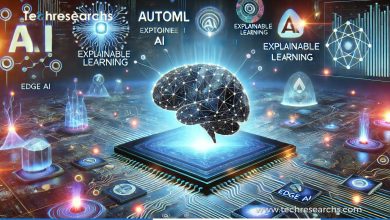Largest Quantum Computers: What Makes Them So Powerful?

The world of quantum computing is rapidly evolving, and the largest quantum computers are at the forefront of this revolution. These machines are not just larger in size, but they also represent a significant leap in computational power, challenging our traditional understanding of how computers operate. In this article, we’ll explore what makes the largest quantum computers so powerful, their potential, and their future impact on technology.
What Are Quantum Computers?
Before delving into the specifics of the largest quantum computers, it’s essential to understand what quantum computers are and how they differ from classical computers. Quantum computers use quantum bits, or qubits, which allow them to process information in ways that classical bits simply cannot. Unlike classical bits, which are either 0 or 1, qubits can exist in multiple states simultaneously, thanks to quantum superposition. This property enables quantum computers to perform complex calculations much faster than their classical counterparts.
The Rise of the Largest Quantum Computers
In recent years, tech giants and research institutions have made significant strides in building the largest quantum computers. These machines harness the power of qubits, superconductivity, and quantum entanglement to unlock new realms of computation. As these systems grow in size, they hold the promise of solving problems that were once thought to be unsolvable.
Some of the largest quantum computers today are capable of performing computations in seconds that would take classical computers thousands of years to complete. This leap in computational power is opening up possibilities in fields such as cryptography, medicine, artificial intelligence, and more.
What Makes the Largest Quantum Computers So Powerful?
Several factors contribute to the immense power of the largest quantum computers. Let’s explore some of the key elements:
1. Qubit Count and Stability
The primary factor that sets quantum computers apart is the number of qubits they possess. The more qubits a quantum computer has, the more complex calculations it can perform. The largest quantum computers have hundreds or even thousands of qubits. However, simply increasing the number of qubits isn’t enough; maintaining their stability is equally important. Quantum coherence, or the ability to preserve the delicate quantum state of a qubit, is a significant challenge that the largest quantum computers must overcome.
2. Superconducting Qubits
Superconducting qubits are one of the most popular types of qubits used in large-scale quantum computers. These qubits operate at extremely low temperatures, typically near absolute zero. This superconducting state allows them to perform calculations without resistance, thus enabling more efficient processing. The largest quantum computers often rely on this technology to achieve unprecedented computational speeds.
3. Quantum Entanglement
Quantum entanglement is another crucial element that makes quantum computers so powerful. When qubits become entangled, the state of one qubit becomes dependent on the state of another, no matter how far apart they are. This phenomenon enables quantum computers to solve problems with high-dimensional data sets, which would be impossible for classical computers to handle efficiently.
4. Quantum Error Correction
Quantum systems are notoriously prone to errors due to environmental interference and instability. However, the largest quantum computers employ advanced quantum error correction techniques to mitigate these issues. These methods ensure that the quantum calculations remain accurate and stable over time, which is essential for their power.
Applications of the Largest Quantum Computers
The potential applications of the largest quantum computers are vast and varied. Here are some areas where these machines could have a transformative impact:
1. Cryptography
One of the most talked-about applications of quantum computing is in the field of cryptography. Quantum computers have the ability to crack encryption methods that are currently considered unbreakable by classical computers. This has major implications for online security and data privacy. Quantum computers can also enable the development of new cryptographic methods that are far more secure than current systems.
2. Drug Discovery and Healthcare
In the medical field, quantum computers can simulate molecular structures and predict how drugs will interact with cells. This could accelerate drug discovery processes and lead to new treatments for various diseases. The largest quantum computers can model complex biochemical reactions, which are currently beyond the reach of classical computers.
3. Optimization Problems
Quantum computers are also capable of solving complex optimization problems. These problems arise in various industries, from logistics to finance, and involve finding the most efficient solution among many possibilities. Quantum computing can provide faster and more accurate solutions, saving time and resources.
4. Artificial Intelligence and Machine Learning
Quantum computing can significantly enhance artificial intelligence (AI) and machine learning algorithms. By processing vast amounts of data much faster than classical computers, quantum machines can improve AI’s ability to learn, adapt, and make decisions. This could lead to breakthroughs in areas like autonomous vehicles, robotics, and predictive analytics.
Challenges and Limitations of Large Quantum Computers
While the largest quantum computers are undeniably powerful, there are still several challenges to overcome:
- Qubit Stability: Maintaining the stability of qubits over time is a significant challenge. Even small disruptions can lead to errors in calculations, which makes long-term computations difficult.
- Scalability: As quantum computers get larger, it becomes increasingly difficult to scale them efficiently. The infrastructure required to support these systems is also a limiting factor.
- Cost: Building and maintaining the largest quantum computers is an expensive endeavor. Only a handful of organizations have the resources to invest in such advanced technology.
- Quantum Software: Quantum software is still in its infancy. Developing algorithms that can fully utilize the power of quantum hardware is an ongoing area of research.
Future of the Largest Quantum Computers
The future of the largest quantum computers looks incredibly promising. As researchers continue to address the current challenges, these machines will only get more powerful and efficient. In the next few years, we can expect quantum computers to become an integral part of industries ranging from healthcare to finance, making groundbreaking advances that were once the stuff of science fiction.
FAQs:
1.What are the largest quantum computers in the world?
A. The largest quantum computers are those with the highest number of qubits and computational power. Companies like IBM, Google, and Rigetti are leading the charge with quantum systems that have hundreds of qubits.
2.How do quantum computers differ from classical computers?
A. Quantum computers process information using qubits, which can exist in multiple states at once, allowing them to perform calculations much faster than classical computers.
What industries will benefit most from large quantum computers?
Industries such as cryptography, drug discovery, finance, and artificial intelligence are expected to benefit greatly from the advancements in quantum computing.



